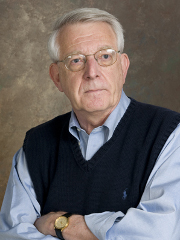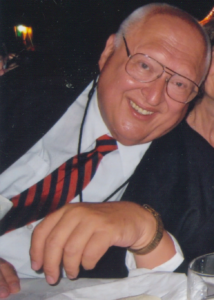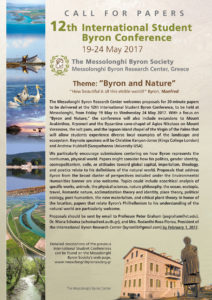A symposium co-sponsored with the Keats-Shelley Association of America at the Huntington Library, San Marino, CA. Details at https://romantics200.org/event/k-saabyron-society-symposium-the-publication-of-frankenstein/
Author: Tom Berenato
Byron Society Collection 2019 Research Award
Byron Society Collection 2019 Research Award
The Byron Society Collection at Drew University Library announces a call for applications for the inaugural Byron Society Collection 2019 Research Award. The Award, which is intended to promote research and scholarship by early career scholars, provides $1,000 for expenses relating to academic research at Drew University Library, home to the Byron Society Collection.
The Award supports scholars specifically intending to use the Byron Society Collection, including its extensive archival holdings, 19th-and 20th-century objects of material culture, and rare books. Scholars in all disciplines are invited to apply. Early career scholars include post-Docs and untenured faculty within five years of completion of their degrees.
To apply, please email the following to speccoll@drew.edu:
- Cover letter including brief statement of interest and your best contact information. Also, please note if you are receiving any additional funding for your research project.
- Two-page description of your research project and its intended outcome.
- Details regarding the resources from the Byron Society Collection that you plan to investigate during your visit and how they will support your research project. For details about the Collection’s holdings, please visit drew.edu/library/special-collections-archives/special-collections/byron-society-collection/
- Curriculum vitae
- Letter of recommendation
The deadline for applications is August 1, 2018. Applications will be reviewed in confidence by the Byron Society Collection Research Award Committee. The Byron Society Collection 2019 Award recipient will be announced in October, 2018. The $1,000 award will need to be used within the 2019 calendar year.
To apply for the Byron Research Award, or to request more information, please email speccoll@drew.edu.
The Byron Society Collection was founded in 1995 by Marsha M. Manns and Leslie A. Marchand. Funding for the inaugural Byron Research Award is given by the Byron Society of America.
Register by April 15 for the 2018 International Byron Conference in Ravenna, Italy
The International Association of Byron Societies organizes an annual conference devoted to the life and works of Lord Byron and his circle. All BSA members are eligible to submit papers and attend the conference.
This year’s conference:
Ravenna, Italy, “Byron: Improvisation and Mobility”
2- 7 July 2018
Registration deadline: 15 April 2018
More information here
Byron Society of America at MLA 2018, NYC
The Byron Society of America will sponsor its forty-fifth annual session at this year’s Modern Language Association Convention in January in New York City. Session details are as follows:
Session 270: “Byron and Politics: A roundtable discussion”
Friday, 5 January 2018, 10:15 AM-11:30 AM
Presiding: Jack Wasserman, (independent scholar and longstanding Board Member of the BSA)
Roundtable participants:
Jonathan Gross (DePaul)
Piya Pal-Lapinski (Bowling Green State)
Andrew Warren (Harvard)
The participants will explore the life and works of Lord Byron in relation to the politics of his own time and ours, with emphasis on the Congress of Vienna and the future of Europe, and discuss how Byron‘s political writings and personal engagements impacted European culture, politics, and art in the post-Napoleonic context. Part of Romantic Bicentennials (http://romantics200.org), the session will engage the long legacy of Romanticism.
The K-SAA talks with Alice Levine about Manfred
BSA at MLA 2017: Byron and Consumption
The Byron Society of America’s panel at January’s MLA convention in Philadelphia is entitled “Byron and Consumption.” Professor Ghislaine McDayter of Bucknell University will preside. See details of the four-speaker lineup here: https://apps.mla.org/program_details?prog_id=201&year=2017.
The panel will convene on Friday, 6 January, 8:30–9:45 a.m., in room 106B of the Pennsylvania Convention Center. Please consider attending.
Tribute to Charles E. Robinson (d. 20 November 2016)
With deep sorrow we announce the death of Charles E. Robinson, admired and loved by his many students and by scholars of Byron and Romanticism worldwide, on November 20, 2016.
A graduate of Mount Saint Mary’s College in Maryland, Charlie earned his Ph.D. from Temple University under the guidance of the great David V. Erdman. In 1965, Charlie joined the English Department at the University of Delaware, where he remained for his entire career and where, after 1990, he was joined by the influential Shelley editor Donald H. Reiman. At Delaware, Charlie served as Director of Graduate Studies in English from 1981 to 1993. He also served for two decades on the editorial board for the University of Delaware Press.
As a scholar, Charlie was deeply dedicated to Byron studies. His first presentation at the Denver MLA in 1969 focused on Byron’s The Deformed Transformed, a paper later incorporated into his first book, Byron and Shelley: The Snake and Eagle Wreathed in Fight (Johns Hopkins, 1976). The fruits of vast reading, thorough archival research, and lively collaboration with colleagues, Charlie’s scholarship hugely expanded our knowledge of the Byron-Shelley circle. Building on his Mary Shelley Reader (edited with Betty T. Bennett; Oxford, 1990), Charlie transformed Mary Shelley scholarship with his Frankenstein Notebooks (Garland, 1996), an edition recently reissued by Routledge. Charlie also co-edited Liberty and Poetic License: New Essays on Byron (with Bernard Beatty and Tony Howe; Liverpool, 2008) and published The Original Frankenstein (Random House, 2009). At his death, Charlie was preparing a new edition of Hazlitt’s letters and a biography of Shelley’s publisher, Charles Ollier. Early, late, completed, and unfinished—these works reflect the wit, acuteness, and effervescence that Charlie himself embodied.
Charlie’s service to the Byron Society was long and enthusiastic. From promoting the fledgling Byron Society in the early 1970s to hosting the Leslie A. Marchand Lecture Series at Delaware in the 2000s, Charlie dedicated enormous energy to all things Byron. He organized two international Byron conferences at Delaware, the first in 1979 on “Lord Byron and His Contemporaries” and the second in 2001 on “Byron: Heritage and Legacy.” From 1996 to 2006 Charlie served as Executive Director of the Byron Society of America and co-chair of The Byron Society Collection, originally at the University of Delaware. In 2015, Charlie himself delivered the annual Marchand Lecture, speaking on the relationship of Byron and Hazlitt. Elected as Joint Treasurer of the International Association of Byron Societies in 1976, he remained on the International Byron Society board until his death. Attendees at Byron conferences in London, Athens, New York, and Moncton among other places will fondly recall Charlie’s lectures, in which his many jokes, digressions, and gesticulations entertained while his insights enlightened.
In addition to his scholarly endeavors, Charlie was a generous mentor and inspiring teacher. His graduate students, many of whom are now scholars in Romantic studies, will remember well Charlie’s office, crowded with books and redolent with the aroma of coffee; his profound and sometimes profoundly unreadable comments on dissertation chapters; and his winking confession that the grade on seminar papers sometimes depended on how many glasses of wine he’d had when reading them. Like the anxious students he initiated into the profession, whose fears he allayed and to whose job searches and cover letters he devoted weeks or months of his life, Charlie apparently never slept. His middle-of-the-night emails of encouragement or early-morning forwards of job advertisements from the Chronicle of Higher Education live in the lore of the Delaware English Department and in the memories of his grateful students. In honor of his kind and indefatigable mentoring, Charlie in 2005 received an Outstanding Advising and Mentoring Award from the University of Delaware. Charlie’s classroom exploits were no less legendary. As Marsha Manns, founder of the BSA and one of Charlie’s undergraduate students at Delaware, recalls, “Every class was an adventure, crammed full of passion and excitement; students eagerly arrived in advance of the 8:30 AM start time and lingered long after the class was over to talk with Charlie. His own enthusiasms for our poets and for his students completely filled the classroom with anticipation.” All of Charlie’s students report similar experiences, though each anecdote is unique. To collect the stories of Charlie’s humor and humanity would require a very long volume.
Charlie leaves behind his wife, Nanette, who was his traveling companion on many Byron-related conferences and adventures, his son John, and his daughter Clare. Charlie will be remembered for his Catholic faith, his service to the community of Arden, his lessons on poetry and meter for high school students in Wilmington, Delaware, and his wry replies to detractors of his beloved West Virginia, both the state and the Mountaineer basketball team. His family, friends, and students will miss his generosity, energy, and passionate inquiries relating to Byron, Mary Shelley, and beyond.
Michael Edson
Call for Papers: 43rd International Byron Conference (Yerevan State University, Armenia)
Please find attached and at this link information about the next International Byron Conference, 28 June – 4 July, 2017. The theme is “Byron, Time and Space.” 250-word abstracts are due February 1, 2017, to samvel.abrahamyan@ysu.am.
A Tribute to J. B. Yount III
With deep sadness we announce the recent death of Joseph Byron Yount III, familiarly known to Byronists worldwide as J. B., on October 2, 2016.
Over a quarter of a century ago J. B., always interested in the poet whose name he shared, contacted Jerome McGann with a scholarly question. “There’s a Byron Society, and you should join it,” Jerry advised. J. B. joined, and for decades he enriched Byronworld with his distinctive presence. J. B. attended international Byron conferences in Nottingham, Prague, Venice, Boston/New York/ Newark DE, St. Andrews, and Versailles.
He served as President of the Byron Society of America, where his legal counsel proved invaluable as the BSA moved its collection of books and other Byroniana to its present home at Drew University. J. B. entertained and edified many Byronists who visited him over more than two decades. His hospitality was lavish, his knowledge of Virginia history extensive, and his smoothly guided tour of Jeffersonian Virginia ranging from Charlottesville to Monticello, Barboursville, Montpelier, Ash Lawn, and Poplar Forest, unforgettable.
J. B. was the proud descendant of two old Shenandoah Valley families and a lifelong resident of Waynesboro Virginia. He was a partner in the Edmunds, Willets, Yount and Hicks law firm and was the second-youngest mayor in Waynesboro’s history. For 25 years he served as Waynesboro’s city attorney, acting also as city planner for much of that time. Well-known as a local historian and lecturer, JB was a pillar of many institutions besides the BSA, among them the Augusta County Historical Society, the Augusta County Bar Association, Fishburne Military School, and the University of Science and Philosophy established at nearby Swannanoa by Walter and Lao Russell. He was a faithful Presbyterian, a staunch Mason, and a fervent Wahoo, a life member of the Waynesboro NAACP and a 60-year member of Farmington Country Club outside Charlottesville. J. B. was a reader, a collector, and a superb raconteur (to experience his mellifluous cadences, read a few paragraphs of Remembered for Love, his biography of Lao Russell), a Virginia gentleman and a citizen of the world—and, like Byron, a profound, amused student of human nature in all its complexity. As Marsha Manns, founder of the BSA, fondly recalls, J. B. “could see through anything–could politic intensely to accomplish a good end and yet have everyone think the world of him. He accomplished more in one lifetime than seems possible and yet he never wearied.”
J. B.’s many friends, in Byron circles and beyond, will miss his warmth, wisdom, generosity, and goodness—and his stories.
Sincerely,
Peter Graham, Vice President, Byron Society of America
Andrew Stauffer, President, Byron Society of America


